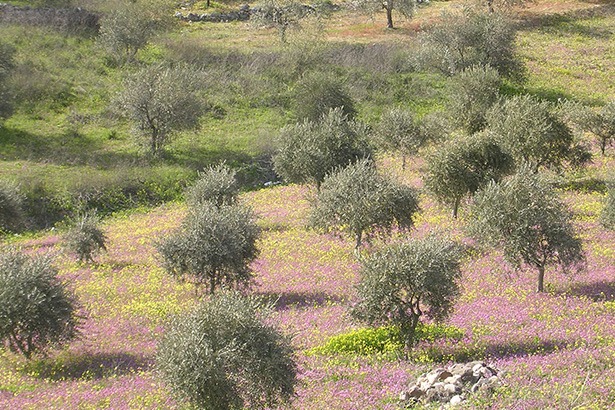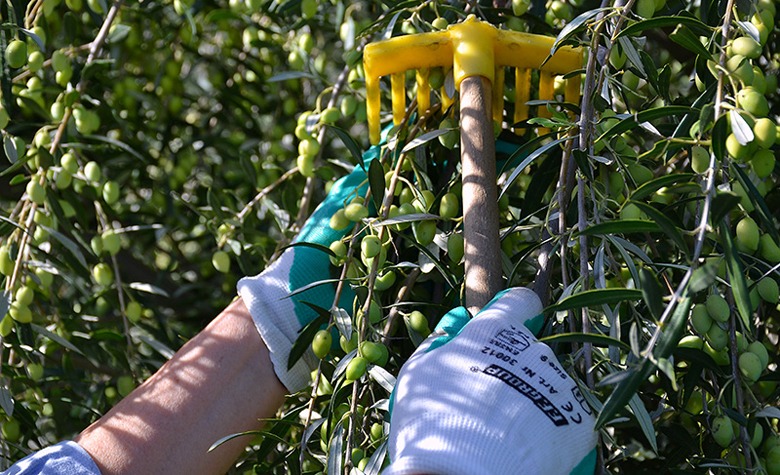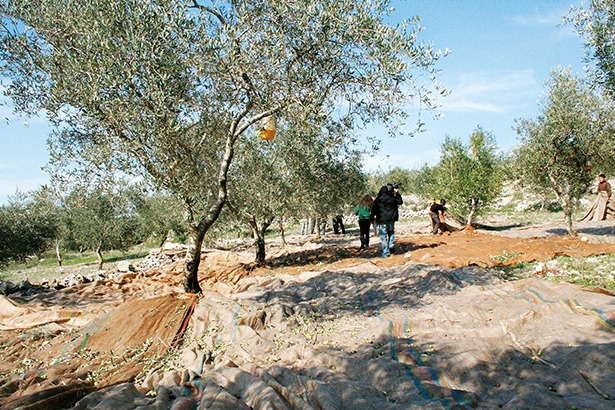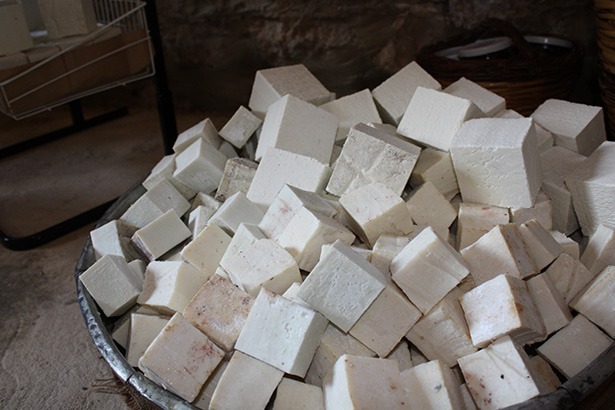Since Phoenician times, olive trees have been an integral part of Lebanese life. They grew in the wild until the Phoenicians began exporting them throughout the Mediterranean thus giving way to their cultivation.

From north to south, the Lebanese have adopted the olive oil cycle. From September to December, villagers are busy with olive season but what of the rest of the year? We’ll explore how the Lebanese used to cultivate olives, in the old days.
The Yearly Routine
We’ve learned that throughout history, olive trees were not high maintenance. With sufficient rainwater, the only work needed would be to plow the land three times a year, once in winter, another in summer and a final time in the autumn.
Although tilling the land was done with the help of bulls and mules, it still required effort from the farmers. This practice no longer takes place today.

Harvest Time
Harvest fell between September and December depending on the region and on whether green (early harvest) or black olives (late harvest) were to be produced.
A common method cultivators used was to spread nets or canvases around the base of the tree so that when they hit the trunk and large branches, with a stick, the fruit would fall onto them. However, this method caused both ripe and unripe fruit to fall, leaving very few olives on the tree. This method bruises the olives, causing the oil within the fruit to deteriorate before even going to the press. It harms the twigs that will bear fruit next year thus jeopardizing the next harvest.
Today the technique has changed and there are other ways to harvest olives to encourage a yearly yield. One such method is handpicking, a labor-intensive process but one that yields a better product. Some also, comb the tree, with a hand-rake, which allows a bit more control than hitting. Others climb the tree and prune the largest and ripest branches, which fall to the ground and are then picked by hand. A more modern technique is to use a long-handled mechanical picker with vibrating tongs to remove ripened olives, without harming the tree.
After all the fruit was collected, they were placed in bags and taken home, where they were stored, while waiting for the entire picking process to conclude. “And this is where the habit of taking your olives home came from,” said Youssef Fares, general manager, Olive Trade, whose family used to own a traditional press in Baeino. “This was very bad as it only deteriorates the quality of the oil. For optimal quality, the olives should be pressed within 24 hours of their picking. Back in the days, this fact was not known”.

Harvest time was when the entire family worked together. The father and the children would go to the field, shortly followed by the mother who would bring a packed lunch and help out. Neighbors helped each other out, if they were done with their own harvests. Farmers would sing as they worked, as these were happy times, despite the hard work.
Pressing Time
After collection, olives are sorted according to their best use. The best olives are set aside for pickling and the bulk is taken to the press to be turned into olive oil. “Our family had a traditional press. The cultivators would book their turns as there was only one press for every two or three villages. They would either bring their harvest over or we would send a worker to bring it in for them,” said Fares.
Traditional olive presses used grindstones to grind the olives, reducing them to a paste from which the oil can be extracted. Unlike the grindstones of a mill, which are horizontally mounted, with one turning atop the other, the grindstones of an olive press are vertically mounted and rotate in a tub, crushing the olives against the floor of the tub. In the old days, it was a mule or a horse that turned the grinder, which is why the process took some a long time as the animals would need to be rested periodically. In the 1940s, motors replaced animals, thus speeding up the process.
The paste is then spread onto round mats, which traditionally used to be made of horsehair. To extract the olive oil, the stacked paste is pressed atop each other and against the press. Olive oil begins to drip down the sides of the stack, collecting in a basin at the bottom of the press and then into a holding tank. Once drained, the olive mash is removed and the process repeated. The mash, made up of the skin and ground pits was and is still used to light fires in winter. The lesser quality oil is also used to make soap or fuel for oil lamps.
The oil that emerges from the press is impure, containing quite a bit of solid matter, as well as a fair amount of water. It is left to settle in the holding tanks to separate the water from the oil. The press operator then adds water to the mix, allowing the oil to flood to the adjacent tank, leaving the impurities behind. This process is repeated several times until the cleanest possible oil is obtained. The olive oil is then stored in large clay pots or in stainless steel vats, in a cool and dark room away from light and heat sources.
It must be noted here that this traditional way of pressing oil does not yield the best quality olive oil. Modern mills have been engineered to cause the least harm possible to the oil during the extraction process.
Where To Go
If you’d like to join in on the fun, the Akkar Olive Trail offers you the opportunity to pick olives, see how olive oil is made, and buy a batch from the following local producers.
- Mar Touma & Haddara. Contact: Walid Haddara (+961 3 885 480)
- Zouk Habalsa. Contact :Riad Hoblos (+961 3 325102)

Where To Buy Olives and Olive Oil
Beirut
- House of Zejd, Achrafieh
In addition to extra virgin and organic olive oil, Zejd select range also includes a unique line of aromatized oils, pickled and stuffed olives as well as traditional olive oil soaps….Make sure to try the olive stuffed chocolates! Contact: (+961 1 338 003).
- Mohammad Zeitoun (+961 71 291 212) / (+961 1 426 222 / 333).
The North
- Tony Maroun, Jounieh (+961 9 910 090)
Chadra, Akkar
- Samir El Zir (+961 3 458 185)
- Joseph Khoury, Bchennine (+961 3 228 849) / (+961 6 555 552)
- Sarkis Moussa, Bchennine (+961 71 777 117)
The South
- Youssef Abed Al Nour / Serge Fadel, Saida (+961 5 461 575)
- Georges Abou Joudeh, Marjayoun (+961 3 345 439)
Soaps

- Ambrah Soaps, Badaro
Ambrah takes a simple yet treasured recipe with 100% premium cold-pressed olive oil and turns it into a true return to the essence of nature. Entirely hand-crafted in Lebanon using the traditional cold-press method, our soaps are mild, moisturizing, and long-lasting. Contact: (+ 961 1 380 885).
- Khan Al Saboun, Tripoli
Khan Al Saboun, with decades of experience, has gained sophistication in the industry of aromatic and therapeutic soap, as well as the decorated soap. You will find unique items that make a perfect gift. Contact: (+961 3 438 369).
- Les Senteurs d’Orient
Produced in Lebanon, Senteurs d’Orient soaps are made with traditional techniques using authentic ingredients and are available all over the country.
- Soap Museum Sidon
Explore the different steps of the traditional olive oil soap production at the Soap Museum in Sidon from raw materials, fuel, and adopted practices for the preparation of the paste, liquefaction, drying, cutting into bars, and final drying prior to packaging and marketing. The shop offers a wide variety of soaps from all over the country. Contact: (+961 7 753 599).
- S’Oil
S’Oil is a family business specialized in making and selling all-natural olive-oil based products that are made in Lebanon at an international level. Products include hand-made and glycerin-based soap as well as a liquid line. Contact: (+961 3 104 635).
Loading

